- Faith ⬦ Read ⬦ Shabbat ⬦ Weekly Torah Portion
Why do we need to work to earn a living? – Parshat Eikev
We believe that G-d provides nourishment and sustains the whole world in His Goodness, no matter what we do to earn a living. So why should we work? Have you heard of the “sparks”?
This week’s Torah portion is called parshat “Eikev.” In this parsha the issue of one’s livelihood is mentioned, regarding the fact that we should remember G-d when we are working hard and finding success in earning a living. Since one’s livelihood is a part of a person’s daily life, there is a famous question which is a central part of this issue: Why does a person have to work at all? Our discussion this week will address this matter.
Moses said to the Nation of Israel, when you succeed and prosper in earning a living, be careful not to forget G-d: “But you must remember the Lord your G-d, for it is He that gives you the strength to make money” (Deuteronomy 8:18). G-d is the one that enables us to succeed. The translation of “Onkelos” interprets the verse as follows: “For He is the one who gives you advice about which assets to acquire.” That is, a person can work hard, but if he doesn’t have the right advice about how to do business, he may find himself losing money. The right advice is the only thing that brings success, and it comes only from G-d.
However, if in the end everything is from G-d and if it is He Who determines our livelihoods, then why do we have to work? If G-d is omnipotent, why can’t He provide us with a livelihood even without our working? Variations of this question can also apply to other areas of life, such as man’s duty to take care of himself and his belongings. After all, we believe that everything that happens is from G-d, then this is especially true with regard to being protected, about which the verse explicitly states: “If the Lord will not guard a city, [its] watcher keeps his vigil in vain” (Psalms 127:1). If G-d is watching over us, then why do we need to make the effort to protect what we have?
In order to answer these questions, we must familiarize ourselves with two important concepts connected to the beginning of the Creation, whose source is in the Kabbalah. These concepts are often mentioned in the lessons of Rabbi Nachman.
The first concept is called the “Chalal HaPanui” or the “empty space” which refers to one of the stages of the beginning of the Creation of the world. The Holy Arizal (the kabbalist, Rabbi Isaac Luria) explains: When G-d wanted to create the world, all that existed was the infinite light of HaKadosh Baruch Hu, and it was not fitting to create the world because everything was merged together with G-d’s Infinite Light. Therefore, G-d “removed” the Infinite Light aside and created the “Chalal HaPanui,” an empty space that was devoid of the Divine Light. In that place of “empty space,” the possibility was created for a creation that was not fully merged with the Infinite Light. This was the only way that it could be possible for the world be created.
However, Rabbi Nachman teaches that this is not such a straightforward matter. There is an incomprehensible contradiction here, because if indeed the light of HaKodosh Baruch Hu was removed from the Chalal HaPanui, then the world wouldn’t be able to exist at all, for there is no possibility of life or existence for anything without G-d. Therefore, it must be that G-d’s Light was also present in the place that the world was created. And if so, one must say at the same time that one thing is true and also the opposite is true: His light was there, but it was also not there. Our world exists, and therefore this means that G-d’s existence is present in the Chalal HaPanui. But on the other hand, there is existence, and yet the world is not completely merged with the G-d’s Infinite Light. Therefore, Rabbi Nachman concludes that this paradox cannot be contained or understood in the human mind but can be accepted only through the faith that man believes that G-d exists even if the existence of Divinity is not clearly apparent in this world.
The second concept is “Shvirat HaKeilim” or the “Breaking of the Vessels.” After G-d created the Chalal HaPanui, He drew down His Light into the Chalal HaPanui and created four worlds, in descending order: Atzilut (“The World of Emanation”), Briyah (“The World of Creation”), Yitzirah (“The World of Formation”), and Asiyah (“The World of Action”) which is our world. When HaKadosh Baruch Hu wanted to create the world, the Divine Light was too great for the vessels to contain it, and as a result the vessels—which were the lights were supposed to receive the Divine light from above—shattered. Many “sparks” of this light were scattered in every direction. It is our mission to restore those sparks to their root through the fulfillment of Torah and mitzvot.
One must say at the same time that one thing is true and also the opposite is true: His light was there, but it was also not there!
Rabbi Nachman adds that there are two types of heresy which take the form of spiritual questions that undermine one’s faith. One type is rooted in the Chalal HaPanui, and the other rooted in the “Breaking of the Vessels.” One can deal with the spiritual questions and doubts which arise from the “Breaking of the Vessels” because they contain lights and sparks of holiness which contain wisdom and Divine Intellect, and therefore it is said: “Know how to answer a heretic” (Pirkei Avot, 2:14), for there is a logic and a purified Divine Intellect that can answer these doubts. On the other hand, the spiritual questions that originate in the Chalal HaPanui, have (supposedly) no logic or Divine Wisdom in them, and we cannot possibly have any understanding about them in our minds, as it says in the verse: “None who enter in them return, nor do they grasp the path to life” (Proverbs 2:19). We are commanded to stay away from any philosophical questions or theories that originate in the Chalal HaPanui. The only way one can deal with the doubts which arise from Chalal HaPanui is as stated: solely through faith (Likutei Moharan I, 64).
Let us return to the question with which we opened our discussion: Since we believe and trust that G-d provides sustenance for us, why do we need to go to work? And also, if it is G-d Who is protecting us, why do we need to make the effort to protect ourselves? The answer lies in the difference in the approach of the Chalal HaPanui and the “Breaking of the Vessels.”
We will first address the issue of protection. All the damage that occurs in the world is rooted in the yetzer hara (the inclination for evil), which is the denial of the Creator, and there are two different categories which correspond to the two types of heresy that are rooted in the Chalal HaPanui and the “Breaking of the Vessels.” There is damage that is rooted in the overabundance of light that caused the vessels to break, where a person must use his mind to prevent any damage as much as it is possible. This is our job here in this world: to strive and to use our senses to the best of our ability to clarify the sparks from within the klippot (“husks”) and to protect our possessions from damaging forces and to return them to their root once they have been fixed. This idea can also apply to when we keep the mitzvot of the Torah. Then we fix things at their root, and the damaging forces which are rooted in the “Breaking of the Vessels,” are subdued and annulled.
But there is another harm rooted in heresy that stems from Chalal HaPanui. It does not matter what we do in our minds to protect ourselves. It will not help, because there is no logical explanation that can clarify the events that led to these damages. Here we are only required to believe in G-d and to trust Him that He will protect us from these damaging forces. We do not have to search too far to understand what types of things this is referring to. The coronavirus that made the world go crazy is a living example of this. Everything they tried to do against it failed, and only G-d can save us from this damage, and yet we are committed to doing what we can to be saved from it.
This also gives us the answer to the question regarding our livelihood. The main thing is trusting in G-d; it is not the effort and striving that brings a person’s livelihood, as it is written: “For neither from the east nor from the west, nor from the wilderness comes success. For God is the Judge, one He humbles and one He raises” (Psalms 75:7-8). Only G-d determines what the channel will be for a person’s livelihood, and yet the person should engage in some business for his livelihood as it is said: “and the Lord, your God, will bless you in all that you do” (Deuteronomy 15:18). At the end of the day, a person’s occupation and livelihood is really for the sake of clarifying the sparks and bringing the world to its tikkun (completion).
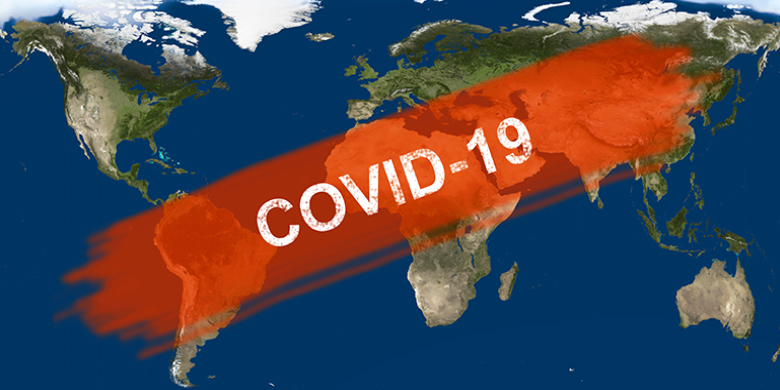
The coronavirus that made the world go crazy is a living example of this!
In fact, there are two stages in earning a living. There is the basis of one’s occupation for earning a living, and then there is the actual work that one does. Our sages said: “A person never knows which business will earn him the most profit” (Pesachim 54b). As long as a man has not found the right thing for him to do to make a living, not only will he not succeed, but he may also lose money, no matter how much effort he puts in. Therefore, the stage of knowing and the best advice about what he should do parallels the Chalal HaPanui, about which there is no reason or logic about what he should do, and nothing he can do will help him earn a living. This is connected only to absolute belief in G-d.
However, after a person has the right advice and through the power of his faith has found the basis for his livelihood, then he is required to work to operate the business that G-d has ordained for him in order to fix the sparks that fell at the time of the “Breaking of the Vessels.” That is our job in this world.
This is what the Torah emphasizes to us in this week’s parsha: “But you must remember the Lord your G-d, for it is He that gives you strength to be successful.” That is, do not be mistaken because you are engaged in earning your livelihood, as if you were the one who also came up with the advice on what to do to earn a living. Do not be mistaken to say so but remember that the advice is only from G-d, as it says in the verse, “for it is He that gives you the strength to be successful,” and the Targum explains: G-d is the One who gives you the advice on what assets to acquire. What the Creator wants from us regarding earning a livelihood is that we should clarify the holy sparks which are hidden in each aspect of doing business. In every type of business and in every facet of our work, there are Divine sparks, and it is our job to reveal them. It is precisely through doing our work that we clarify and rectify them.
To conclude, if we are anyway going out to work, we should at least know that we are fulfilling an important mission in earning our livelihood. There is a Purpose to our work. There are many sparks of holiness, and G-d wants us to clarify them. This will result in the rectifying of the world and bringing it to perfection. Too bad the boss doesn’t know how to appreciate it…
(Based on Likutei Halachot, Pikadon 3)
- Atzilutbelieve in GodBreaking of the VesselsbreslevBreslovChalal HaPanuicollecting the sparksDvar Torah for Parshat Eikevearn livingeikevEmpty Spacefallen sparksfeaturedincomeInfinite LightJewishjudaismLikutey HalachotLikutey MoharanParashat EikevparnassaParshat EikevParshat EkevReb NosonRebbe NachmanShvirat HaKeilimThe World of ActionThe World of Emanation
- 1 comment


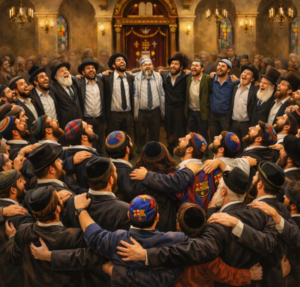



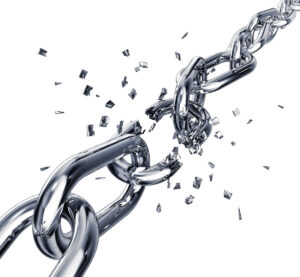



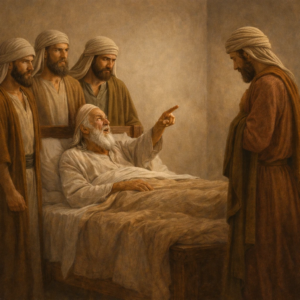

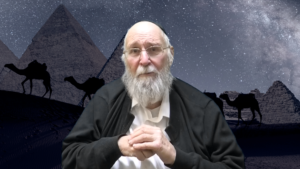









One Response
Baruch Hashem. Very very very very very good and interesting.
Tizku l’mitzvos.